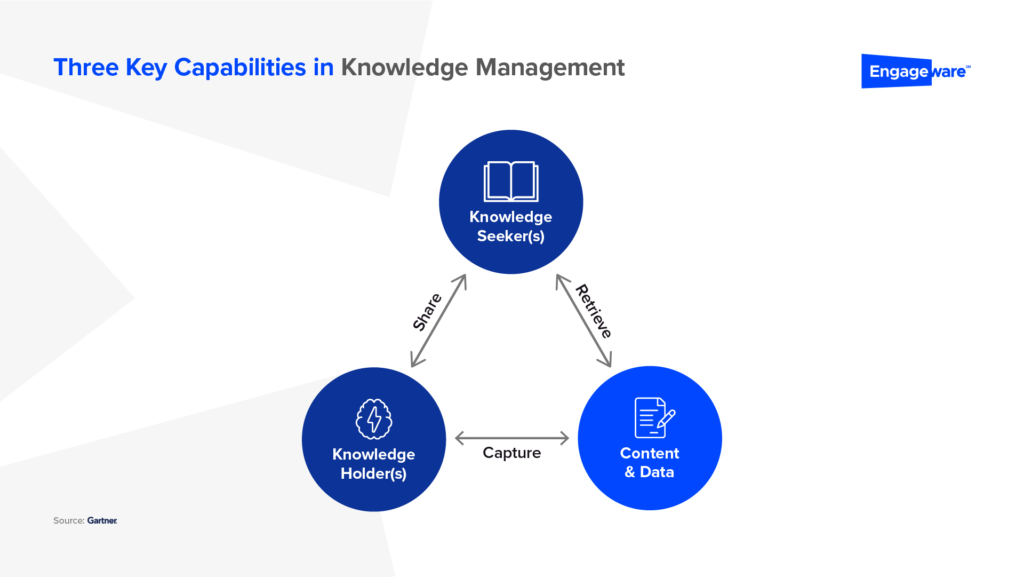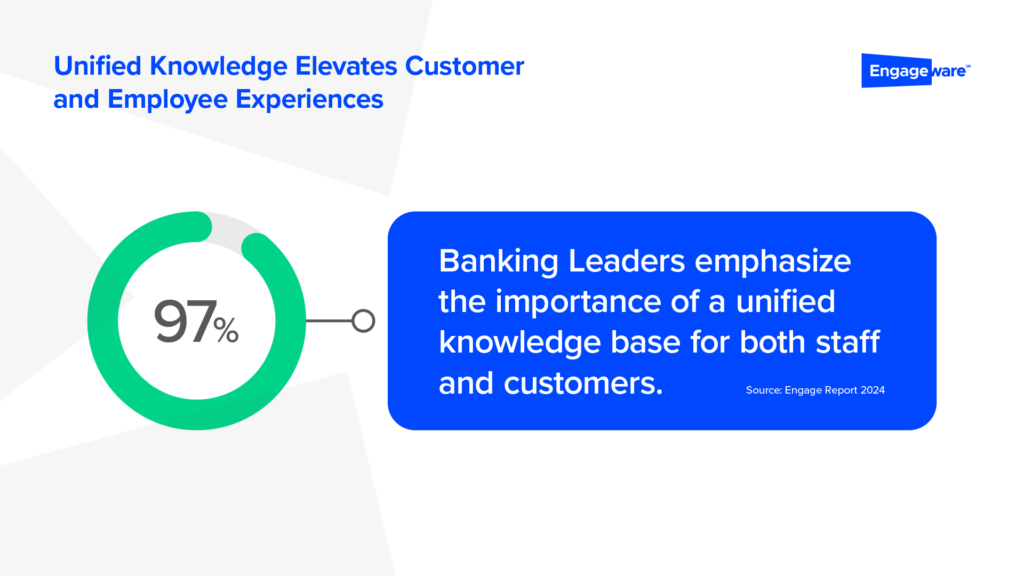As financial institutions grapple with the increasing demands for immediate and accurate customer service, the need for intuitive Customer Service Knowledge Management Systems (CS-KMS) becomes ever more crucial. Gartner reports a growing imperative for leaders in operational roles to adopt enterprise service management programs, with expected growth in adoption from 10% today to 40% by 2026 for business success. This trend is driven by the need to improve operational efficiencies and enhance customer service interactions, emphasizing the crucial role of knowledge management solutions across various business functions.
This urgency is backed up by recent industry findings, revealing the significant challenge of high employee turnover—identified by 80% of banking leaders as a major obstacle to customer engagement — and the strain on service professionals who juggle an average of seven different systems for customer service.
Raising the question: How can financial institutions boost engagement and maintain operational efficiency without overworking their staff?
What is Knowledge Management Software?
At its core, a Knowledge Management Platform is a technology solution designed to capture, organize, and disseminate knowledge within an organization.
With the rise of AI, this knowledge base is now enhanced to offer insights that ensure information is not only stored but also easily accessible and actionable. The AI-driven approach empowers employees with the right information at the right time, fostering a culture of informed decision-making.
Knowledge management has always been a core capability of customer service. However, increased customer expectations for near-real-time personalized response and resolution have exposed the limitations of conventional tools.
A holistic approach to Knowledge Base Systems unfolds into three key capabilities:
- End-user engagement ranks and presents the most relevant answers to a specific query or ingest a single relevant actionable insight to a moment in a user journey, and additionally gives a user the ability to navigate a corpus of content.
- Curation and contextualization support the discovery/retrieval, sorting, and clustering of content assets for delivery at relevant moments in the user journey, including metadata, search, and monitoring/reporting/analyzing performance.
- Content life cycle management captures, assesses, authors/creates, reviews, edits, publishes, controls and retires knowledge assets.

Employee Efficiency Starts with Simplifying Knowledge Access
The traditional methods of manually reviewing and revising knowledge content have shown to be insufficient for keeping data current, a challenge acknowledged by sixty-one percent of customer service knowledge management practitioners, report keeping information up to date as one of the most challenging aspects, according to a Garnet survey.
Financial leaders must consider CS-KMS content health optimization tools that reduce at scale, the manual review and revision burden on knowledge contributors, subject matter experts and knowledge managers.
Gartner further reveals that 74% of customer service and support (CSS) leaders cited improving knowledge and content delivery to customers and employees as a priority.
Leaders are now looking towards advanced knowledge Management Solutions designed to alleviate the manual burdens of updating and maintaining employee’s intranets. Furthermore, the emphasis on improving knowledge delivery underscores the importance of accessibility—not just within customer service centers but across departments—facilitating a collaborative approach to sharing expertise and ensuring timely, accurate responses to customer inquiries.
The Influence of Advanced Conversational AI
By incorporating banking chatbots into customer service, organizations face the challenge of enhancing chatbot capabilities for meaningful self-service banking, prompting a reevaluation of knowledge management integration for better service delivery.
Advanced AI Virtual Assistants, enriched with conversational AI-driven solutions, promises to revolutionize how information is accessed and utilized, aiming to fulfill customer expectations and operational efficiency. Ensuring that information is not just stored but is also easily accessible and actionable.
By 2025, 70% of virtual customer assistant and virtual agent assistant projects that lack integration to knowledge management systems will fail to meet their customer satisfaction and operational cost-reduction goals, as reported by Gartner.
Alongside these technological advancements, maintaining a human touch is paramount. Customers highly value the option to connect with a human agent when needed, highlighting the need for a balanced approach that integrates advanced technology to support the human element.
Enhancing Employee Retention and Satisfaction
Leveraging the balance between technology and staff by integrating knowledge seamlessly into service flows enhances both customer and employee experiences, leading to improved satisfaction and retention.

Integrating AI advanced solutions into knowledge management solutions like Engageware can significantly boost employee efficiency.
AI-enhanced search capability allows employees to quickly find precise answers from within extensive documents, streamlining the information retrieval process. Such advancements not only improve the accuracy and speed of customer service responses but also greatly aid in training new employees by providing them with a tool that supports their learning curve from day one.
By utilizing AI to understand context and synonyms within the organization’s knowledge base, new hires in customer support can adapt more quickly. This enhances both employee satisfaction and productivity. Leveraging knowledge management for operational and employee efficiency exemplifies a shift towards optimizing call center operations, ultimately redefining team access to information and maximizing productivity and satisfaction levels.
Engageware’s Knowledge Platform addresses these needs by providing:
- A single source of truth for all organizational knowledge, reducing informational silos.
- Enhanced customer support through faster resolution times and improved service quality.
- Increased employee engagement and performance by minimizing the time spent searching for information.
How a Credit Union Streamlines Employee Knowledge Management for Enhanced Efficiency and Member Service
In the heart of Texas, United Heritage Credit Union transformed its knowledge management approach with a clear vision: outstanding member service begins with an empowered team. Facing a clunky employee intranet that hindered quick information access, they partnered with Engageware. This move wasn’t just about adopting new technology; it was a commitment to enhancing the way their team worked together. By slashing search times from 13 seconds to a mere second, they didn’t just speed up processes—they reclaimed over 300 hours in eight months, allowing the team to focus more on their core mission: serving their members.
The credit union’s employees now had a ‘shared intuitive employee intranet’, a unified source of knowledge that made onboarding new hires faster and serving members easier. This collaboration highlights how embracing technology, guided by a vision for empowered employees, leads to seamless customer engagement with operational efficiency benefits.
The strategic implementation of a Knowledge Management approach can significantly impact your financial institution’s ability to serve its customers effectively, comply with regulations, and maintain a competitive edge. Explore how Engageware Knowledge Management can transform your organization’s strategy.